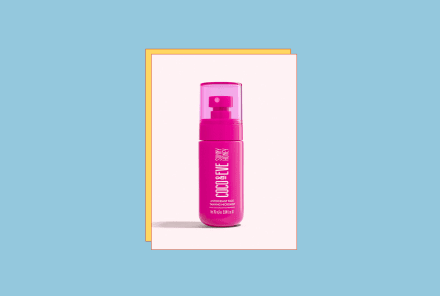Advertisement
At What Age Should You Start Taking Collagen Supplements? Our Answer


In the wellness realm, collagen supplements are revered for their science-backed and anecdotal benefits for the skin. Yet, when the popular ingredient is associated with words like "firmer skin" and "youthful," it can be tricky to know at what age you should start taking it. Let's look at how—and when—collagen supplements might fit into your routine.
First up: What can you expect from a collagen supplement?
Taking collagen supplements can be a game-changer for your skin's health. This structural protein, after all, is what makes the skin firm and strong1. Most notably, research has found that supplementation could help pump the brakes on wrinkles, sagging, and other signs of skin aging1.* There's also evidence that dietary collagen supplements could support skin moisture2 and elasticity3, giving your complexion that healthy glow.*
These benefits don't stop at your face, though. Another study determined that supplementing with collagen peptides could help aid brittle nails, promoting strength and firmness4.* Furthermore, collagen may play a role in proper wound healing, along with bone health and exercise recovery.*
As the most abundant protein in the human body, collagen is undeniably important—and consuming supplements could help up your body's levels. But if you're new to the collagen train, you might be wondering when you should hop on.
At what age should I start taking collagen supplements?
When it comes to collagen supplements, there isn't a "right" age to start taking them. There also isn't a one-size-fits-all answer. The optimal time for you depends on many factors, including genetics and lifestyle habits. (More on that in a sec.) With that said, there are some things to consider when deciding the best time to begin:
Collagen decline starts in your 20s.
For starters, your collagen levels naturally decline with age. Generally, this begins in your 20s and continues to decrease about 1% each year5. So, it's not a bad idea to start thinking about supporting your body's collagen levels early on—before they dip too low.
Consider lifestyle factors.
Your lifestyle matters a heck of a whole lot, too. This includes any habit that exposes your skin to oxidative stress, collagen's worst foe. According to Jessie Cheung, M.D., board-certified dermatologist, oxidative stress activates enzymes that target and degrade collagen in your dermal matrix. It can also cause inflammation, impair the skin barrier, and mess with the function of your skin stem cells. As a result, your body's collagen—and skin health—will significantly decline.
In terms of collagen degradation, sun exposure is one of the worst offenders. (It's also one of the easiest to change, by the way.) "UV light exposure causes generation of free radicals, [which] trigger reactions that damage healthy cells," explains Blair Murphy, M.D., FAAD, board-certified dermatologist. In the skin, "this oxidative damage breaks down collagen." Other harmful habits include eating excess sugar, smoking cigarettes, and environmental pollution. Even lack of sleep and poor nutrition can speed up collagen decline.
In short: The answer is different for everyone.
With so many factors at play, your collagen needs will likely be different from someone else. So, consider your lifestyle habits and how you've been treating your skin thus far. This can help you understand what factors you can modify, like applying sunscreen more frequently or cutting back on sugary foods. It can also help you gauge whether your skin could use a collagen boost sooner rather than later.
If (or when) you decide to add supplements to your routine, it's crucial to know what they can't do: Collagen supplements won't reverse deep, pronounced lines—nor can they lift very loose skin. Basically, they won't magically vanish existing, severe signs of aging. "You can use collagen to reverse minor things, like crow's feet around the eyes but not once the skin's gotten too leathery and damaged," explains functional medicine doctor Robert Rountree, M.D., in mbg's podcast. Therefore, it's best to use them as a preventive method to avoid signs of aging—and to make sure they don't worsen over time.
While you're at it, Murphy recommends defending your skin from sun exposure as early as possible. This will safeguard the collagen you already have and set you up for a lifetime of excellent sun protection habits. "It's easier to prevent collagen loss in the first place than to stimulate new collagen formation and replace it later in life," she adds.
The bottom line.
"Collagen is like the stuffing in your mattress—it keeps your skin plump and smooth," says Cheung. But since collagen production slows down with age, "it's never too early to start investing in your skin's health." If there's only one thing you remember, make it this: Collagen supplementation is a preventive measure. This means it works best before the onset (or progression) of deep wrinkles and severe sagging. So, if you're ready to get serious about your skin health, it's certainly worth thinking about taking collagen supplements and practicing other skin-friendly habits.
Watch Next
Enjoy some of our favorite clips from classes
Enjoy some of our favorite clips from classes
What Is Meditation?
Mindfulness/Spirituality | Light Watkins
Box Breathing
Mindfulness/Spirituality | Gwen Dittmar
What Breathwork Can Address
Mindfulness/Spirituality | Gwen Dittmar
The 8 Limbs of Yoga - What is Asana?
Yoga | Caley Alyssa
Two Standing Postures to Open Up Tight Hips
Yoga | Caley Alyssa
How Plants Can Optimize Athletic Performance
Nutrition | Rich Roll
What to Eat Before a Workout
Nutrition | Rich Roll
How Ayurveda Helps Us Navigate Modern Life
Nutrition | Sahara Rose
Messages About Love & Relationships
Love & Relationships | Esther Perel
Love Languages
Love & Relationships | Esther Perel

















